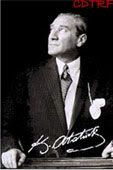Turkish Koc Opens 50th Store in Russia
The fourth Ramstore in St. Petersburg considered being Russia's gateway to Europe was opened with a ceremony on Monday.
The Ramstore chain the Koc Holding-Enka partnership started in Russia in 1997 has opened 50 stores in this country.
Koc Holding Honorary President Rahmi Koc speaking at the opening ceremony of the store that was opened with a $30 million investment at the Baltic Sea town expressed his confidence in Russia.
"We were not demoralized during the crisis period in Russia. We did not abandon the country. We continued the investments. We believed in the Russian people's determination. The Ramstores reaching 50 are the evidence of this faith and confidence."
Ramstore has become one of the credible brands of Russia since 1997 and it has increased the number of stores in St. Petersburg to four with Ramstore Udelny Park located on an area of 41,200 square meters.
The businessman, Koc, said the holding will increase this number to 10 by 2007.
Making an investment in such a charming historic town of St. Petersburg, said Koc, gives them a different pride, and they consider themselves as part of this community. The Russian economy serves as a model to the world with its six percent growth and sustainability; that attracts the foreign capital to the country and Koc holding felt this attraction in 1997.
The Ramstores put to sale 35,000 high quality products in the world standards and are aiming at increasing the number of stores to 10 within two years. Koc, in his speech, thanked the municipality authorities and their partner, Sarik Tara, for encouraging the investments since the very first day.
The number of Ramstores in Russia increased to fifty with the openings that took place in the last three months. The total number of Ramstores in five different countries has reached 62. The new shopping center is on the highway in the Primorsky region connecting St. Petersburg to Finland.
-Zaman News / Petersburg
The Ramstore chain the Koc Holding-Enka partnership started in Russia in 1997 has opened 50 stores in this country.
Koc Holding Honorary President Rahmi Koc speaking at the opening ceremony of the store that was opened with a $30 million investment at the Baltic Sea town expressed his confidence in Russia.
"We were not demoralized during the crisis period in Russia. We did not abandon the country. We continued the investments. We believed in the Russian people's determination. The Ramstores reaching 50 are the evidence of this faith and confidence."
Ramstore has become one of the credible brands of Russia since 1997 and it has increased the number of stores in St. Petersburg to four with Ramstore Udelny Park located on an area of 41,200 square meters.
The businessman, Koc, said the holding will increase this number to 10 by 2007.
Making an investment in such a charming historic town of St. Petersburg, said Koc, gives them a different pride, and they consider themselves as part of this community. The Russian economy serves as a model to the world with its six percent growth and sustainability; that attracts the foreign capital to the country and Koc holding felt this attraction in 1997.
The Ramstores put to sale 35,000 high quality products in the world standards and are aiming at increasing the number of stores to 10 within two years. Koc, in his speech, thanked the municipality authorities and their partner, Sarik Tara, for encouraging the investments since the very first day.
The number of Ramstores in Russia increased to fifty with the openings that took place in the last three months. The total number of Ramstores in five different countries has reached 62. The new shopping center is on the highway in the Primorsky region connecting St. Petersburg to Finland.
-Zaman News / Petersburg

